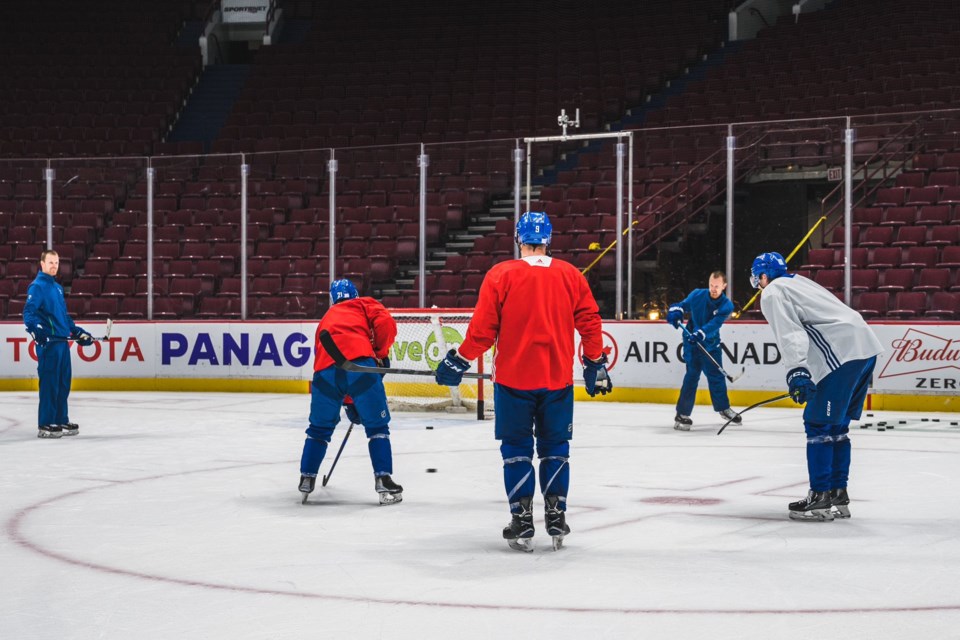Vancouver Canucks head coach Rick Tocchet repeatedly stressed the importance of this off-season as the Canucks' regular season came to a close. He wanted to make sure that the players were training properly and coming to camp ahead of next season in peak physical condition.
Unfortunately, it seems the Canucks took that mandate a step too far. On Monday, the NHL fined the Canucks $50,000 for violating the off-season training rules in the Collective Bargaining Agreement (CBA), according to DailyFaceoff's Frank Seravalli.
According to ChekTV's Rick Dhaliwal, the fines are related to on-ice sessions held by the Canucks from April 17 to 23 after the season concluded. Six Canucks players skated with Daniel and Henrik Sedin, including Dakota Joshua and Jack Studnicka.
"I was surprised by it," said Canucks general manager Patrik Allvin. "[It was] voluntary. We had several players that were in discussions for the World Championships, we had players that were going through their rehab sticking around here in Vancouver, and we had some young players that couldn't go down to Abbotsford that asked for extra help. We wanted to help the players and we're very surprised by the fine."
The CBA, as negotiated between the NHL and the NHLPA, has strict rules surrounding training camps. Teams are not allowed to have mandatory training camps beyond the one at the beginning of the season and a summer "conditioning camp" that is aimed at prospects and typically called a development camp by the Canucks.
Rule 15.11 in the CBA states, "Other than the Conditioning Camp described in Section 15.10 above, a Club is prohibited from organizing or holding any mandatory or voluntary camp in the off-season for any Players."
The word "voluntary" is key there. Even if attendance at the "camp" is voluntary, it's against the rules.
The Memorandum of Understanding (MOU) that brought the players back on the ice after the stoppage due to the COVID-19 pandemic expanded Rule 15.11, replacing it with even stricter rules regarding what teams are allowed to do.
Prohibited Off-Season Activities. Clubs are not permitted to have Club Coaching or Hockey Operations personnel (e.g., coaches, skating instructors, other Club employees, contracted service providers, etc.) participate in any on-ice sessions with Players.
Clubs are not permitted to request or encourage Players to come to the Club’s home city during the off-season to utilize the Club’s arena/training/practice facility(ies) and/or to train with Club Coaching or Hockey Operations personnel.
Clubs are not permitted to pay for Players’ travel costs, per diems or housing for Players who choose to stay in or come to the Club’s home city during the off-season to utilize the Club’s arena/training/practice facility(ies) and/or to train with Club Coaching or Hockey Operations personnel.
In all instances, if Players choose to stay in or return to the Club’s home city to train over the summer, it must be on a Player-initiated basis only, and all associated costs must be borne by the Player.
Clubs are not permitted to use electronic or computerized programs to track or monitor a Player’s offseason activity or conditioning.
Clubs are not permitted to facilitate or pay for Players to receive training/conditioning services during the off-season from: (i) Club Strength and Conditioning Coaches who may own separate businesses and provide off-site/off-season services (even where Players may want to utilize such services during the off-season); or (ii) third-party services providers that may provide training and conditioning services to Players inside or outside of the Club’s home city (e.g., Gary Roberts, Adam Oates, etc.)
It's not clear how many of these rules the Canucks broke with their on-ice sessions with the Sedins, but since the Sedins are Hockey Operations personnel, it's clear that they broke at least one rule. Since the sessions were held in Vancouver, if the team requested or encouraged the players to come to Vancouver for the sessions, that would be another violation.
The biggest reason these rules are in place is to prevent teams from making unreasonable demands of a player's time. NHL teams would surely love to micromanage the off-season training of their players but the players also need to have time off and have control over their own lives during the summer months. It also places the onus of training and preparing for the off-season solely on the players themselves, who are responsible for arranging and paying for their own training during the off-season.
Teams and players frequently skirt this rule ahead of training camp by having unofficial on-ice training sessions organized by the players. As long as coming to the city early and getting on the ice together is initiated by the players, that's fine.
It's possible that Tocchet's frequent petitions to the players to come to Vancouver early ahead of training camp next season could constitute a violation of this rule. As much as Tocchet wants to instill a winning culture, breaking the rules of the CBA might not be the best way to do it.
Teams typically have people in their hockey operations whose primary responsibility is interpreting and applying the CBA. This can be an assistant general manager or a legal adviser, depending on the team. The Canucks currently have a job posting up for a Chief Legal Officer, who would advise on CBA issues.
The Canucks also do not currently have a player representative with the NHLPA. Bo Horvat was their player representative until he was traded at the end of January, at which point Riley Stillman took over. Stillman was traded a month later and was never replaced as player representative.
"At the end of the day, it's my responsibility," said Allvin.




